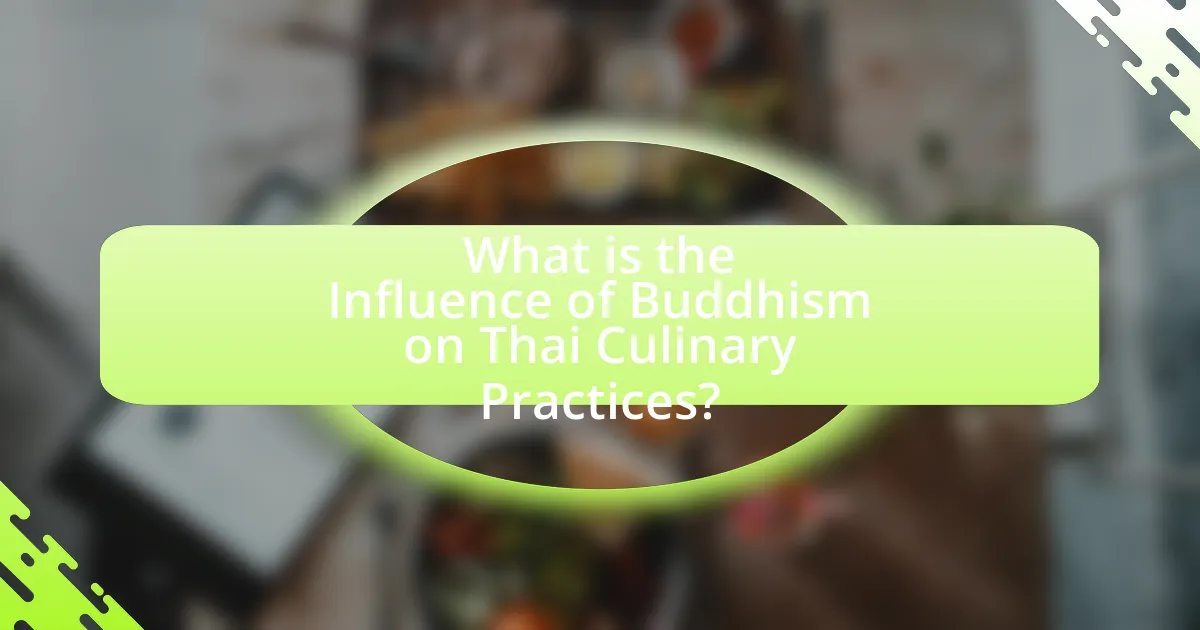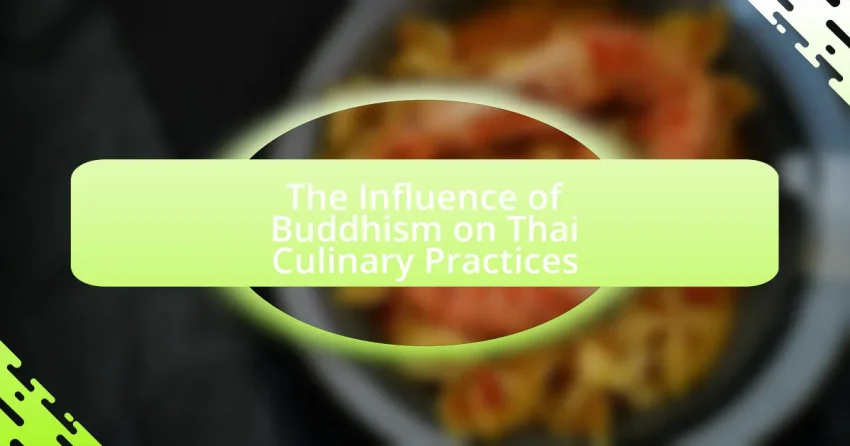The article examines the significant influence of Buddhism on Thai culinary practices, particularly through the promotion of vegetarianism and mindful eating. It highlights the core Buddhist principles of non-harming (ahimsa), mindfulness, and moderation, which shape dietary habits and food choices among Thai Buddhists. The article discusses how these principles manifest in traditional Thai dishes, the role of vegetarianism during Buddhist festivals, and the challenges faced by chefs in maintaining these culinary traditions amidst modern dietary trends. Additionally, it offers practical tips for incorporating Buddhist values into Thai cooking, emphasizing the importance of fresh ingredients and mindful preparation.

What is the Influence of Buddhism on Thai Culinary Practices?
Buddhism significantly influences Thai culinary practices by promoting vegetarianism and the mindful consumption of food. The majority of Thai Buddhists observe the principle of ahimsa, or non-violence, which leads many to adopt a vegetarian diet, especially during religious observances such as Uposatha days. This dietary preference is reflected in the prevalence of vegetarian dishes in Thai cuisine, such as pad thai and various curries made without meat. Additionally, Buddhist teachings emphasize mindfulness in eating, encouraging individuals to appreciate food as a gift and to consume it with gratitude. This cultural context shapes not only the types of food prepared but also the rituals surrounding meals, reinforcing the connection between spirituality and culinary practices in Thailand.
How has Buddhism shaped the dietary habits in Thailand?
Buddhism has significantly shaped dietary habits in Thailand by promoting vegetarianism and the avoidance of meat, particularly among monks and lay followers. The Buddhist principle of ahimsa, or non-violence, encourages the consumption of plant-based foods to minimize harm to living beings. This has led to a widespread cultural acceptance of vegetarian dishes, especially during religious observances such as Buddhist Lent, when many Thais abstain from meat. Additionally, the practice of offering food to monks reinforces the importance of mindful eating and the sharing of meals, further embedding vegetarian options into Thai cuisine.
What are the core Buddhist principles that affect food choices?
The core Buddhist principles that affect food choices include the concepts of non-harming (ahimsa), mindfulness, and moderation. Non-harming emphasizes the importance of avoiding harm to all living beings, which influences many Buddhists to adopt vegetarian or vegan diets to minimize suffering. Mindfulness encourages individuals to be aware of their food choices and the impact of those choices on their health and the environment. Moderation promotes balance and restraint in consumption, discouraging overindulgence. These principles collectively guide Buddhists in making ethical and conscious food choices that align with their spiritual beliefs.
How do these principles manifest in everyday Thai cooking?
Buddhist principles manifest in everyday Thai cooking through the emphasis on balance, mindfulness, and the use of fresh, natural ingredients. Thai cuisine often incorporates the concept of “four flavors”—sweet, sour, salty, and bitter—reflecting the Buddhist belief in harmony and balance in life. Additionally, many Thai dishes are prepared with mindfulness, focusing on the process and the ingredients, which aligns with Buddhist practices of being present and aware. The use of fresh herbs and vegetables in Thai cooking not only promotes health but also respects the Buddhist principle of non-harm, as these ingredients are often sourced locally and sustainably.
Why is vegetarianism significant in Thai Buddhism?
Vegetarianism is significant in Thai Buddhism because it aligns with the principle of ahimsa, or non-violence, which is central to Buddhist teachings. This practice reflects the belief in compassion towards all living beings, as many Thai Buddhists choose to abstain from consuming meat to avoid causing harm to animals. The significance is further emphasized during specific periods, such as the annual Buddhist Lent, when many adherents adopt a vegetarian diet as a form of spiritual discipline and purification. This commitment to vegetarianism is also supported by the presence of numerous vegetarian festivals in Thailand, such as the Vegetarian Festival in Phuket, which attracts thousands of participants and highlights the cultural integration of Buddhist values into culinary practices.
What role does vegetarianism play during Buddhist festivals?
Vegetarianism plays a significant role during Buddhist festivals as it aligns with the core Buddhist principle of non-violence towards all living beings. During these festivals, many Buddhists abstain from consuming meat to honor this principle and to cultivate compassion. For instance, during the annual Buddhist Lent, which lasts for three months, many practitioners adopt a vegetarian diet as a form of spiritual discipline and reflection. This practice is rooted in the belief that refraining from harming animals contributes to a more peaceful and harmonious existence, both individually and collectively. Additionally, the Vegetarian Festival in Thailand, celebrated in October, emphasizes this commitment, where participants engage in vegetarianism to purify their bodies and minds, reflecting the teachings of the Buddha.
How do Thai Buddhists approach the concept of meat consumption?
Thai Buddhists generally approach meat consumption with caution and mindfulness, often adhering to the principle of non-harm (ahimsa). Many Thai Buddhists practice vegetarianism, especially during religious observances, as a way to minimize suffering to animals. This practice is rooted in the belief that all living beings deserve compassion and that consuming meat can contribute to negative karma. Additionally, the Thai Buddhist community often emphasizes the importance of intention behind food choices, leading many to avoid meat to align with their spiritual values.
What are the traditional Thai dishes influenced by Buddhist practices?
Traditional Thai dishes influenced by Buddhist practices include vegetarian dishes such as Pad Thai, Som Tum (green papaya salad), and various curries made without meat. These dishes reflect the Buddhist principle of non-violence and compassion towards all living beings, which encourages a vegetarian diet, especially during religious observances. The Thai Buddhist tradition emphasizes the importance of mindfulness in food preparation and consumption, leading to the creation of flavorful, plant-based meals that adhere to these ethical guidelines.
Which ingredients are commonly used in Buddhist-inspired Thai cuisine?
Common ingredients in Buddhist-inspired Thai cuisine include vegetables, tofu, rice, and herbs. These ingredients reflect the Buddhist principles of vegetarianism and mindfulness in food preparation. For instance, tofu serves as a protein source, while a variety of vegetables like eggplant, spinach, and mushrooms are frequently used to create balanced and nutritious dishes. Rice is a staple in Thai cuisine, often accompanying meals, and herbs such as basil, cilantro, and lemongrass enhance flavor while adhering to the dietary restrictions observed in Buddhist practices.
How do cooking methods reflect Buddhist values?
Cooking methods in Buddhism reflect values such as mindfulness, compassion, and non-violence. These values are evident in practices like vegetarianism, which promotes compassion towards all living beings, and the use of simple, natural ingredients that align with the principle of non-harm. For instance, the preparation of food often emphasizes the importance of being present and aware during cooking, which fosters mindfulness. Additionally, communal cooking and sharing meals embody the value of community and interconnectedness, reinforcing the Buddhist belief in the importance of relationships and harmony.
How does the influence of Buddhism transition into modern Thai culinary practices?
The influence of Buddhism transitions into modern Thai culinary practices primarily through the emphasis on vegetarianism and the use of fresh, natural ingredients. Buddhist teachings advocate for non-violence and compassion towards all living beings, which has led to a significant vegetarian culture in Thailand, especially during religious observances such as Buddhist Lent. This is evidenced by the popularity of vegetarian festivals, where many Thais abstain from meat and consume plant-based dishes. Additionally, the principles of mindfulness and moderation in Buddhist philosophy encourage the preparation and consumption of food that is wholesome and nourishing, further shaping contemporary Thai cuisine.
What are the contemporary interpretations of Buddhist culinary traditions?
Contemporary interpretations of Buddhist culinary traditions emphasize mindfulness, vegetarianism, and sustainability. These interpretations reflect the core Buddhist principles of compassion and non-harm, leading many practitioners to adopt plant-based diets that avoid meat and animal products. In Thailand, this is evident in the popularity of vegetarian festivals, such as the Nine Emperor Gods Festival, where participants adhere to strict vegetarian diets for spiritual purification. Additionally, modern chefs incorporate traditional Buddhist ingredients and cooking methods into contemporary dishes, promoting local and organic produce to align with the Buddhist value of respecting nature. This fusion of tradition and modernity showcases how Buddhist culinary practices continue to evolve while maintaining their foundational ethical principles.
What challenges do Thai chefs face in maintaining Buddhist culinary traditions?
Thai chefs face significant challenges in maintaining Buddhist culinary traditions, primarily due to the increasing globalization of food culture and the demand for non-vegetarian options. The influence of Western dietary habits has led to a decline in the adherence to vegetarianism, which is a core aspect of Buddhist culinary practices. Additionally, the availability of traditional ingredients has diminished, making it difficult for chefs to prepare authentic vegetarian dishes that align with Buddhist principles. Furthermore, the commercialization of food has pressured chefs to prioritize profit over tradition, often resulting in the dilution of authentic recipes and practices.
How do modern dietary trends impact traditional Buddhist practices?
Modern dietary trends significantly impact traditional Buddhist practices by introducing new food choices and altering eating habits among practitioners. For instance, the rise of veganism and vegetarianism, which aligns with Buddhist principles of non-harm, has led some Buddhists to adopt stricter dietary restrictions, while others may feel pressured to conform to contemporary health trends that prioritize convenience over traditional practices. Additionally, the globalization of food culture has resulted in the incorporation of non-traditional ingredients and cooking methods into Buddhist cuisine, potentially diluting the authenticity of traditional dishes. Research indicates that these shifts can create tension between maintaining cultural heritage and adapting to modern lifestyles, as seen in studies examining dietary changes among Thai Buddhists in urban areas.
What strategies can chefs use to honor Buddhist influences in their cooking?
Chefs can honor Buddhist influences in their cooking by emphasizing vegetarian and plant-based dishes, as Buddhism promotes a diet that minimizes harm to living beings. This approach aligns with the Buddhist principle of ahimsa, or non-violence, which encourages the consumption of foods that do not involve the killing of animals. Additionally, chefs can incorporate mindfulness into their cooking process, focusing on the intention behind each dish and the quality of ingredients used. This practice reflects the Buddhist value of being present and aware in all actions. Furthermore, using traditional cooking methods and local, seasonal ingredients can enhance the authenticity of the dishes, connecting them to the cultural and spiritual heritage of Buddhism in Thailand. These strategies not only respect Buddhist teachings but also enrich the culinary experience by fostering a deeper connection to the food and its origins.
What practical tips can be applied to incorporate Buddhist principles into Thai cooking?
To incorporate Buddhist principles into Thai cooking, focus on using fresh, local ingredients and practicing mindfulness during the cooking process. Fresh, local ingredients align with the Buddhist value of respecting nature and promoting sustainability. Mindfulness in cooking encourages a deeper connection to the food, fostering gratitude and awareness of the preparation process. Additionally, consider vegetarian or plant-based recipes, as Buddhism emphasizes compassion towards all living beings. This approach not only adheres to Buddhist teachings but also reflects traditional Thai culinary practices that often prioritize vegetables and herbs.
